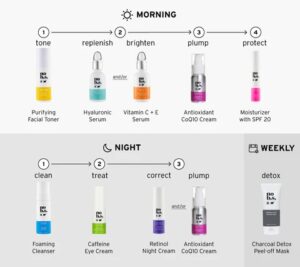Embarking on a journey to establish a skincare routine tailored for sensitive skin requires patience, knowledge, and a commitment to nurturing your skin with utmost care. Individuals with sensitive skin often experience reactions to harsh ingredients, environmental factors, or stress. Crafting a gentle and effective skincare routine is vital to maintaining a healthy complexion while minimizing the risk of irritation. This guide will explore the essential steps to build a skincare routine specifically catered to sensitive skin.
Know Your Skin:
Understanding your skin’s unique needs is the first step in creating an effective skincare routine. Sensitive skin can manifest in various ways, including redness, itching, burning, or dryness. Identify any triggers or allergens that might cause adverse reactions and avoid products containing these ingredients.

Choose Gentle Cleansers:
For sensitive skin, a gentle, fragrance-free cleanser is necessary. Look for sulfate-free options that won’t remove the skin’s natural oils. Cleansing twice daily, in the morning and evening, helps remove impurities without irritating them. Warm water is preferable to hot water to avoid over-drying.
Incorporate a Soothing Toner:
A calming and alcohol-free toner can be beneficial for sensitive skin. Look for ingredients like chamomile, aloe vera, or calendula, which possess soothing properties. Toners aid in restoring the pH balance of the skin and prime it for further skincare procedures.
Prioritize Hydration:
Hydrating sensitive skin is crucial to maintain its moisture barrier and prevent dryness. Choose a fragrance-free, hypoallergenic moisturizer that includes hyaluronic acid or glycerin. Apply the moisturizer in the morning and evening to keep your skin well-hydrated.
Sunscreen is Non-Negotiable:
Protecting your skin from harmful UV rays is paramount, especially for sensitive skin. Choose a broad-spectrum sunscreen with at least 30 SPF. Look for mineral-based sunscreens containing zinc oxide or titanium dioxide, as they tend to be gentler on sensitive skin.

Be Mindful of Exfoliation:
While exfoliation is essential to remove dead skin cells, it must be approached cautiously for sensitive skin. Limit exfoliation to once or twice a week, using a gentle exfoliant with ingredients like alpha hydroxy acids (AHAs) or beta hydroxy acids (BHAs). Over-exfoliation can lead to irritation, so monitor your skin’s response and adjust accordingly.
Patch Test New Products:
Introducing new products into your skincare routine can be risky for sensitive skin. Conduct patch tests on a small area before applying products to your entire face. This helps identify potential allergens or irritants that may trigger adverse reactions.
Consult a Dermatologist:
Consulting a dermatologist is crucial if you struggle to find the right products or experience persistent skin issues. A skincare professional can assess your skin’s needs, recommend suitable products, and provide personalized advice for managing sensitive skin.
Conclusion:
Building a skincare routine for sensitive skin requires a thoughtful and gentle approach. By understanding your skin’s unique characteristics, choosing appropriate products, and prioritizing hydration and protection, you can create a routine that nurtures and supports your sensitive skin. Remember, consistency and patience are critical as you embark on this journey towards a healthier, more resilient complexion.
